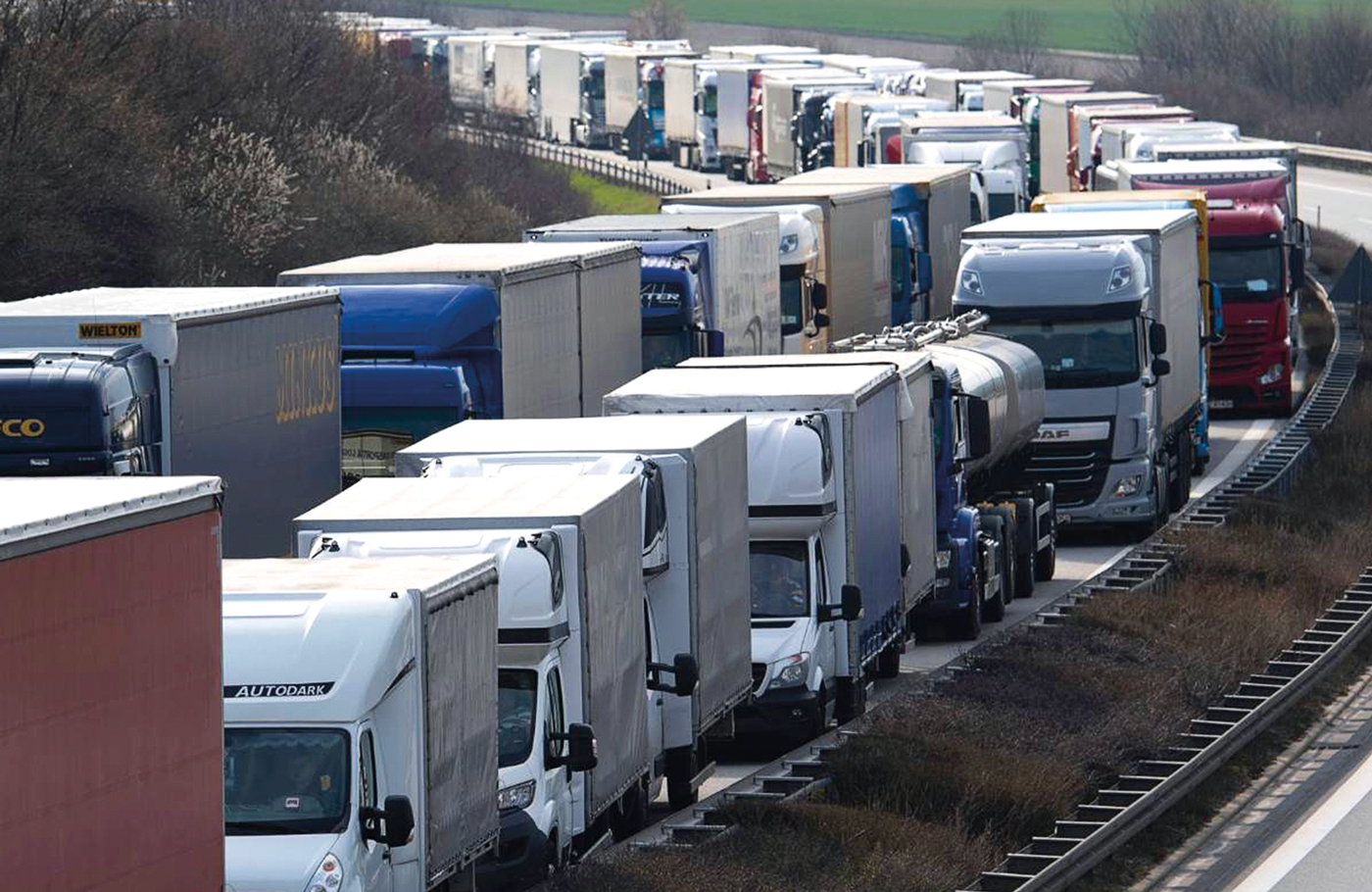Drivers are trucking Covid to Botswana – really?
Drivers are trucking Covid to Botswana – really?
Truck drivers are the arch-enemy of the people of Botswana right now. Because, along with all the other provisions they’re taking to the country, they’re also trucking Covid-19 into Botswana. That’s the accusation. I decided to dig a little deeper and find out if this is, in fact, reality
Many years ago, truck drivers were blamed for spreading HIV/Aids on our continent. Now, fingers are being pointed at them for spreading Covid-19. The accusations have become particularly heated in Botswana, with truck drivers supposedly accounting for a whopping 80% of infections in that country.
Voice of America (VOA), the international multimedia news organisation funded by US taxpayers, has reported that truck drivers, “who deliver the majority of the landlocked country’s goods from Covid-hit South Africa, are also responsible for 80% of the country’s reported Covid-19 cases”. On August 2, it announced that there were 739 positive cases in Botswana, and 621 of them were truck drivers.
VOA is far from alone in its reporting. “Botswana’s local transmission cases have almost doubled to 140 from 71 registered on July 13, while total cases stand at just over 800. Of those, 664 were mostly from foreign truck drivers who have since been sent back to their countries of origin,” the Daily Maverick reported on July 31.
The reports led Business Insider Africa to sound an ominous warning: “The riskiest thing a citizen of Botswana can do during the coronavirus pandemic is drive a truck in South Africa,” it noted.
Botswana has long had very stringent processes in place at its borders – which led me to question these statements. I decided to probe a little deeper, and I was disgusted at what I found.
Horrific and inhumane conditions
My first port of call was a courier company, which runs vehicles between Gaborone and Johannesburg on a daily basis, using the Skilpadshek border post. My chat with the company’s CEO (who spoke to me on condition of anonymity; I’ll call him Mr X in future) saddened me because of the utterly horrific and inhumane conditions faced by truck drivers entering Botswana (I am mindful of the fact that this can happen when truckers enter other countries too).
He tells me that truck drivers going through Skilpadshek can easily face a week of no access to fresh water, decent food, sleep, toilets and showers. “The procedure going into Botswana is the same irrespective of the nationality of the driver. They join the queue to the border post, and they have no clue how long they will be there. When border post officials test positive, the border is closed while the offices are sanitised. This can (and does) happen repeatedly. Based on this, drivers can easily run out of food or water (if the queue takes longer than expected),” Mr X reports.
Accordingly, the courier company is providing its drivers with ration boxes. “These guys are living almost like refugees. Some people say that they should plan ahead and be self-sufficient. But how can they be self-sufficient when there is no clear and fixed timing? Hence, we are providing drivers with ration boxes that they can access in emergencies. But how many other companies are doing this?” asks Mr X.
Sleeping in the queue is out of the question; other truckers will jump the queue. It’s also notoriously dangerous (crime is commonplace) and so drivers must constantly remain vigilant.
Once the trucks reach the border post, the drivers are tested for Covid-19. There are some serious question marks over the validity of these tests. “I had two drivers who tested positive. They had absolutely no symptoms and so I sent them for new tests. They both tested negative two days after their so-called positive tests at Skilpadshek,” Mr X reveals.
Mike Fitzmaurice, executive director of Federation of East and Southern Africa Road Transport Associations (Fesarta) and CEO of the Transist Bureau, has also voiced concerns over the testing. “Their testing procedures are questionable. Also, they don’t give the driver a test report,” he notes.
Stay put!
So, maybe the test results are valid. Maybe they’re not. Irrespective of this, the drivers receive their test results two days later. Meanwhile, even if they’re negative, Batswanas still have to enter quarantine for 14 days once they’re in the country. This means no work or wages for those drivers for a fortnight.
Mr X says that this means that some companies would rather not employ a Batswana. “It’s clearly not ideal to have a driver who has to go through a mandatory quarantine after every single trip,” he notes. Accordingly, he has completely changed his operations. More about that later.
Drivers from other countries are allowed to enter Botswana, but they have to drive straight to their drop-off point, and they travel with a police escort. At no stage are the drivers allowed to leave the truck – meaning they cannot buy food or water, go for a shower or take a bathroom break.

Still no food, water, shower or toilet
Once the driver reaches his drop-off point, the goods are offloaded. The driver must remain in the truck the whole time. “Because of this horrendous situation, some clients (who are receiving the goods) are providing food and water to the poor drivers. But this is the exception to the rule,” says Mr X.
Then the driver (most probably starving, exhausted and dirty) is escorted back to the border by the police. Once again, he’s not allowed to leave the truck to buy food or water, go for a shower or visit the toilet. Back at the border, there’s yet another queue to join. Only once he’s back in South Africa can the driver leave his truck to purchase food or water, have a shower or go to the bathroom.
Because Mr X has enjoyed “a long and excellent relationship” with his drivers, he is still employing Batswana drivers. Obviously, those drivers simply cannot be quarantined after every trip so, as previously mentioned, he’s changed his entire operation. “My driver loads up in Johannesburg and then drives to Skilpadshek. At the same time, I send an empty truck to Skilpadshek from Gaborone. Basically, the two drivers exchange trucks. The driver who has come from Johannesburg turns around and heads back to Zeerust, where he rests for a day. We take the truck that has come from Johannesburg, thoroughly sanitise it and take it and its load to Gaborone.”
Essentially, this means he is using two vehicles to do the job of one truck. And two drivers too. This translates into expenses that have skyrocketed while his rates have remained unchanged. “Of course, under these circumstances, it’s impossible to make a profit. However, that’s not my goal right now. My job right now is to break even. Anyone who is trying to profit at this time is just plain stupid. When this pandemic is over, companies that are lucky enough to have survived can make money,” Mr X believes.
But let’s get back to the issue of Covid-19, and the drivers being blamed for its coming into Botswana. Is this fair? Mr X, for one, doesn’t think it’s fair or even valid. “Truck drivers are fingered because THEY are the people who are being tested! What about all the other people roaming around the country who are not being tested? They could be positive too,” he insists.
Congestion is to blame
Fitzmaurice agrees. “It’s easy to blame the trucking industry but I’m not 100% sure it’s correct. If it IS the case, I blame congestion at the border post. The drivers should not be kept waiting for days on end; the officials have gone about this wrong,” he says.
Mr X believes that, instead of laying blame on drivers, people should be grateful for the fact that they’re continuing to work during the pandemic. “Our drivers should be praised. Instead, they are being treated as though they have leprosy. I don’t understand the finger-pointing at the truck drivers and the accusations that ‘they are the ones bringing the disease’. I believe my truck drivers are more sanitary than my office staff because they are isolated all the time. They are cautious to the point that they are not even picking up passengers anymore; they are too afraid.
“These drivers should be praised by everyone in Botswana. We are 99% dependent on South Africa for everything. We would be nowhere without the drivers coming in. They are the ones keeping everyone alive; without them, we would starve,” Mr X says.
Heroes, not villains
Fitzmaurice agrees. “All this finger-pointing at truck drivers just doesn’t add up. With no clear evidence, how can the claim be made that the drivers are responsible for spreading the pandemic? These people are heroes – not villains!”
Guillaume Olivier, general manager SHEQ at Unitrans Africa, concurs. “The drivers are making massive sacrifices and they continue to work to ensure that Botswana gets the critical resources it needs to survive,” he maintains.
If anything, he says the truck drivers could actually be the victims during the pandemic. “I am of the opinion that we are missing the psychological and social impact this has on the drivers. Consider that they are constantly exposed to being tested. They have to live with the fear of being infected and how this will impact them and their families. They also need to endure continued isolation and we all know that we are social creatures who need interaction.”
He believes that truck drivers are getting a raw deal. “Our drivers are working under exceptionally difficult circumstances. I believe they need to be acknowledged as heroes,” he says.
Instead, exactly the opposite is true, as Mr X notes: “A driver’s life is very unpleasant at the moment. He faces endless delays, continual testing for the virus and reduced earnings. On top of it all, he is also now public enemy number one.”
What an incredibly sad and unfair situation.
Published by
Charleen Clarke
focusmagsa




